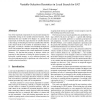Free Online Productivity Tools
i2Speak
i2Symbol
i2OCR
iTex2Img
iWeb2Print
iWeb2Shot
i2Type
iPdf2Split
iPdf2Merge
i2Bopomofo
i2Arabic
i2Style
i2Image
i2PDF
iLatex2Rtf
Sci2ools
105
click to vote
AAAI
1997
1997
Variable-Selection Heuristics in Local Search for SAT
One of the important components of a local search strategy for satisfiability testing is the variable selection heuristic, which determines the next variable to be flipped. In a greedy local search such as GSAT, the major decision in variable selection is the strategy for breaking ties between variables that offer the same improvement in the number of unsatisfied clauses. In this paper, we analyze a number of tie-breaking strategies for GSAT and evaluate the strategies empirically using randomly generated 3-SAT instances from a hard distribution of random instances. We find that the property of fairness, which was proposed in the literature as being the critical property of a successful variable strategy, is not a sufficient property, and show that randomness plays a significant role in the success of variable selection heuristics.
AAAI 1997 | Intelligent Agents | Local Search | Variable Selection | Variable Selection Heuristics |
Related Content
| Added | 01 Nov 2010 |
| Updated | 01 Nov 2010 |
| Type | Conference |
| Year | 1997 |
| Where | AAAI |
| Authors | Alex S. Fukunaga |
Comments (0)

